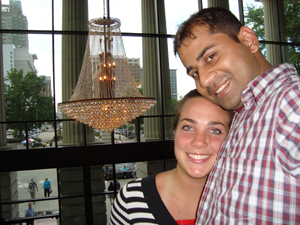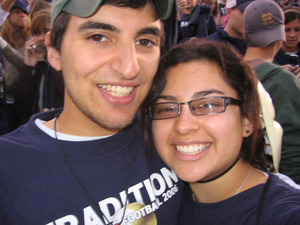Relationships can be tough, whether there are 30 miles or 3,000 miles between the principals, but two couples know the secrets to keeping their faith and relationships strong during their time away from each other.

Oconomowoc native Jennifer Laffin, 23, was willing to move wherever her boyfriend, now fiancé, Nabeel Ahmed, 27, could get a job upon her graduation from the University of Wisconsin-Oshkosh in the fall of 2008, but when those plans fell through, she still had an itch to get out of Wisconsin.
With a major in human resources and a minor in religious studies, she knew she wanted to help people, and realized that she’d have to do that with or without Ahmed.
“I realized I couldn’t live for him or through him,” she said in an e-mail interview with MyFaith. “I needed to live for myself. I needed to live in (California) because that is somewhere I’ve always wanted to go and this was the perfect time to because Nabeel would not want to live there, so I could get it out of my system now.”
Through the AmeriCorps program, Laffin found Conservation Corps North Bay, the nation’s first local nonprofit conservation corps, formerly known as Marin Conservation Corps, two weeks after she graduated. She was there for seven months. During her second week, she went to the Marin County Fire Department’s Firefighting Academy and was challenged physically and spiritually.
“I was petrified,” Laffin said about the training. “It was the most physically demanding and terrifying (thing) I have ever done, like I was fighting fire – it could have killed me, but I ended up loving it and being really proud of myself.”
But Laffin knew she wasn’t alone in this journey, even if she didn’t have Ahmed by her side.
“God got me through it all,” she said, referring to the many struggles and challenges she faced in California. “I can’t think of specific things, but many times while in California, I would honestly laugh out loud and smile because I know God was the one to get me through my obstacle.”
Laffin and Ahmed share different religions – Laffin is Catholic and Ahmed practices Islam – but their faith is the same.
“We both pray to God all the time, specifically about our problems,” Laffin said. “…but it is definitely good that we believe in the same God. If we didn’t, I’m not sure this relationship would work out.”
Besides nurturing her faith by attending Mass most weekends at a church in San Raphael, Calif., where her program placement was, she talked to Ahmed in the mornings, afternoons and nights to keep their relationship strong.
“Nabeel and I texted each other every morning, would talk after work and say goodnight before we went to sleep,” she said. “It is so wonderful to hear “good morning” and “goodnight” from the person you love, even if they are not physically there with you, and you need to talk in the middle of the day to see how each other’s days have gone.”
After working from May through December of 2008 as an AmeriCorps crew member in California, Laffin traveled to Raleigh, N.C., where she worked as a Habitat for Humanity deconstruction crew member from January through July. Ahmed’s plans were still not set and Laffin didn’t want to rely on that.
“I thought if I did another AmeriCorps program I could get almost all my student loans paid off and I could have another adventure,” she said, explaining that the downside of the arrangement was missing out on activities with friends and holidays with her family in Oconomowoc.
“It just makes me miss my family and realize that I need to be home for as many holidays as I can because I don’t know how many more I will have with ALL my family,” Laffin said, adding that it’s sad to think about when her grandparents are aging and family members have illnesses.
Despite seeing Ahmed, her family and friends only a few times during the course of her AmeriCorps work, the list of pros is longer that the list of cons that includes missing people, missing out on events, missing hugs and childbirths, to name a few.
But the independence she gained, experiences she had, people she met, site seeing she did, new things she tried were all beneficial to her and didn’t compromise her family relationships – she saw one of her brothers and his family, who lived five hours from her in North Carolina – or her friends, too much.
“Most of them stayed the same, but some did fade,” Laffin said. “I still have the friendships, but they are not as strong – I’m sure it would have happened with time (though).”
Overall, the distance between Laffin and Ahmed ended up having a positive effect on their relationship.
“I realize how much he means to me and how much I miss him,” Laffin said, explaining why she feels the distance strengthened their bond. “And that we are meant to be. It’s not that I needed a boyfriend, (because) I’m sure I could have found one in CA or NC, but it is HIM that I need.”

Austin, Texas, native Isaac Garcia, 23, is in Wisconsin through the Echo program, a two-year graduate service-learning catechetical training program run by the University of Notre Dame. Currently working as an intern at St. James Parish, Menomonee Falls, Garcia and his fiancée, whom he met while attending Notre Dame, chose to go the extra distance to fulfill what they felt were their callings.
“After much prayer and discussion, we decided to do the distance thing,” Garcia said in and e-mail interview with MyFaith. “I ended up in the Archdiocese of Milwaukee, while (she) enrolled in a clinical psychology doctoral program in Washington, D.C.”
Finances and time sometimes get in the way of their monthly visits, but altogether, Garcia said the experience has benefited their relationship.
“Especially as we continue to prepare for out life together in marriage, this time apart has allowed us the opportunity to improve our verbal communication, which is important for any relationship,” he said.
The Echo program also places members in an intentional faith community with others in the program, so Garcia has been placed with two other men with whom he has learned how to live, eat and pray.
“This opportunity that I have had to be part of an intentional faith community will help (her) and I as we strive to create an intentional faith household together,” he said.
Valuable as the experience has been, Garcia still misses his fiancee. Though video chats through Skype have been helpful, loneliness and pain, especially when they encounter personal struggles, can make life difficult when a hug from his best friend is what he needs.
“Loving someone a thousand miles away is challenging,” Garcia said. “It is a sort of romantic challenge: how can I show (her) I love her today? How can I let her know that she is loved? That she is the woman of my dreams, my soul mate?”
Garcia gets around this by buying little gifts for her, sending love letters and e-mails and even “ a few dollars for a frozen yogurt ‘date.’” He also said, like Laffin and Ahmed, they set aside a time to talk daily.
“But above all these things, our God and our faith in our God has kept us together,” Garcia said. “Without our prayers for each other and the prayers of others for us, I don’t know if we could do the distance.”
Sometimes the distance has caused Garcia to struggle in his faith life, but the reflection he’s done on being satisfied by God alone has helped him put his relationship with his significant other into perspective with the larger goal in mind.
“If we do our marriage the way it is meant to be done, through our marriage (she) and I should lead each other to Christ,” he said.
As Garcia and his fiancee prepare for their marriage across the miles – she flies into Milwaukee to attend marriage preparation courses with Garcia at Notre Dame, makes many of the phone calls for vendor arrangements and is taking a year off from school – they’ve learned how to live and grow together while they’re apart.
“It has forced us to trust each other – the only other option would be constant worrying and anxiety,” Garcia said. “The distance has called us to trust in God more and more. While the calling sometimes goes unanswered, it has allowed us to grow closer to God.”
Garcia said that the distance and time in between visits also makes changes more visible than if they were to see each other daily, but that it makes them realize that their commitment is more than a “yes” to each other, but a “yes” to an uncertain future.
“Our marriage will be during good times and in bad, in sickness and in health, for richer, for poorer, all the days of our lives,” he said, adding that their commitment stays the same in closeness and proximity.
His advice is to look at the distance as a chance to grow; to continue to pray and share faith; and to be open to distance because God is full of surprises.
“One of the most important things to remember is to make your significant other a priority in your life,” he said.
